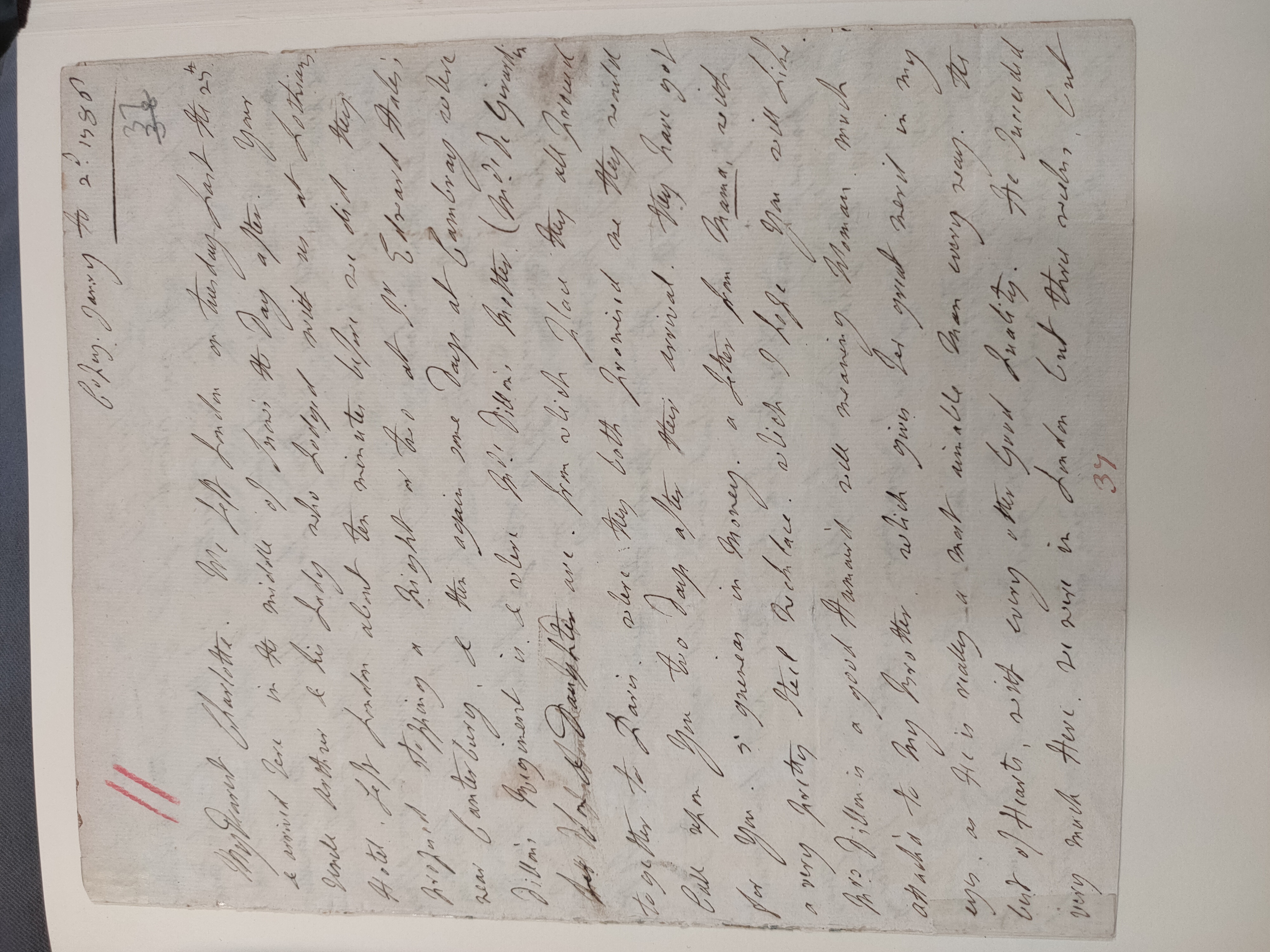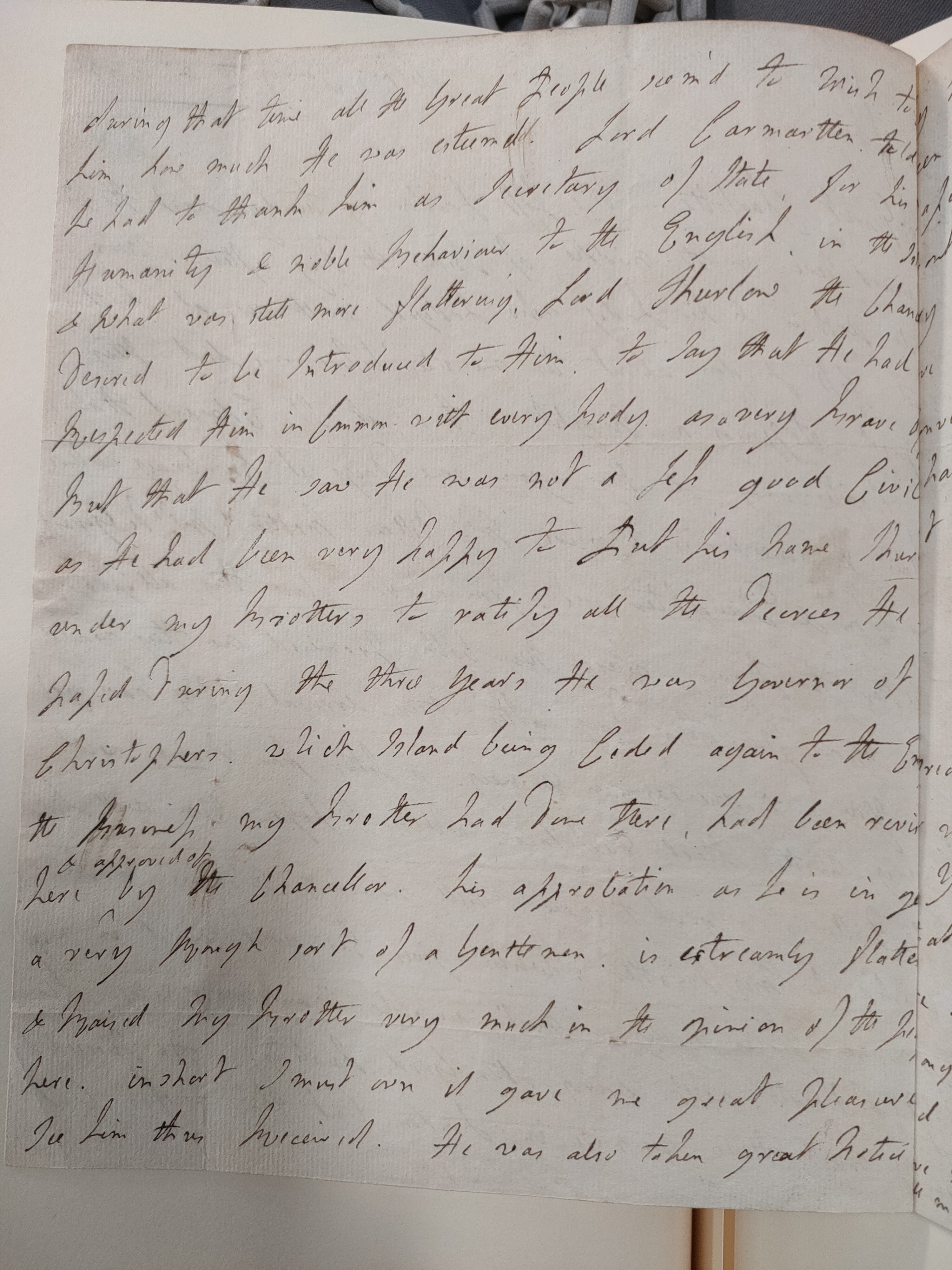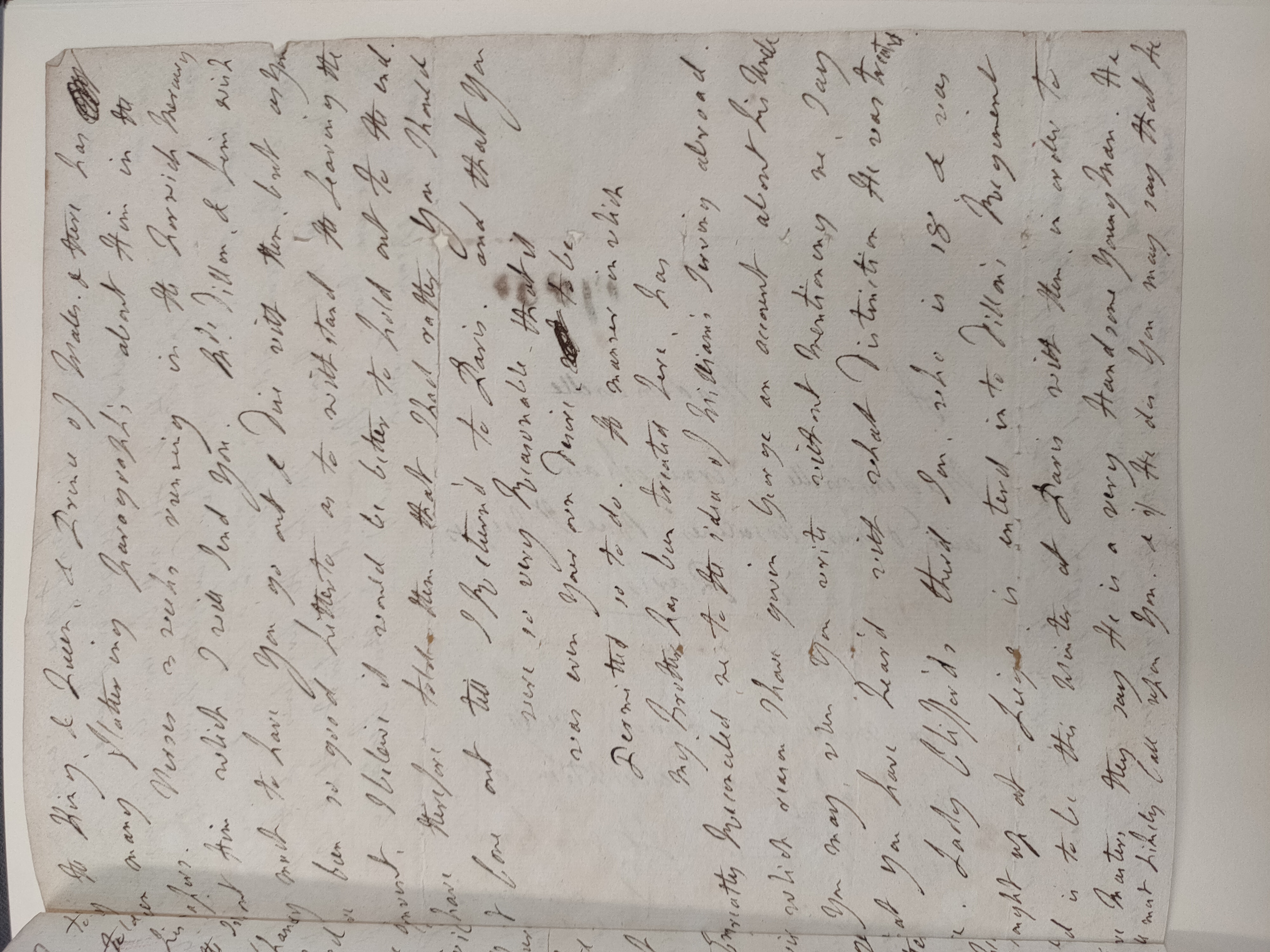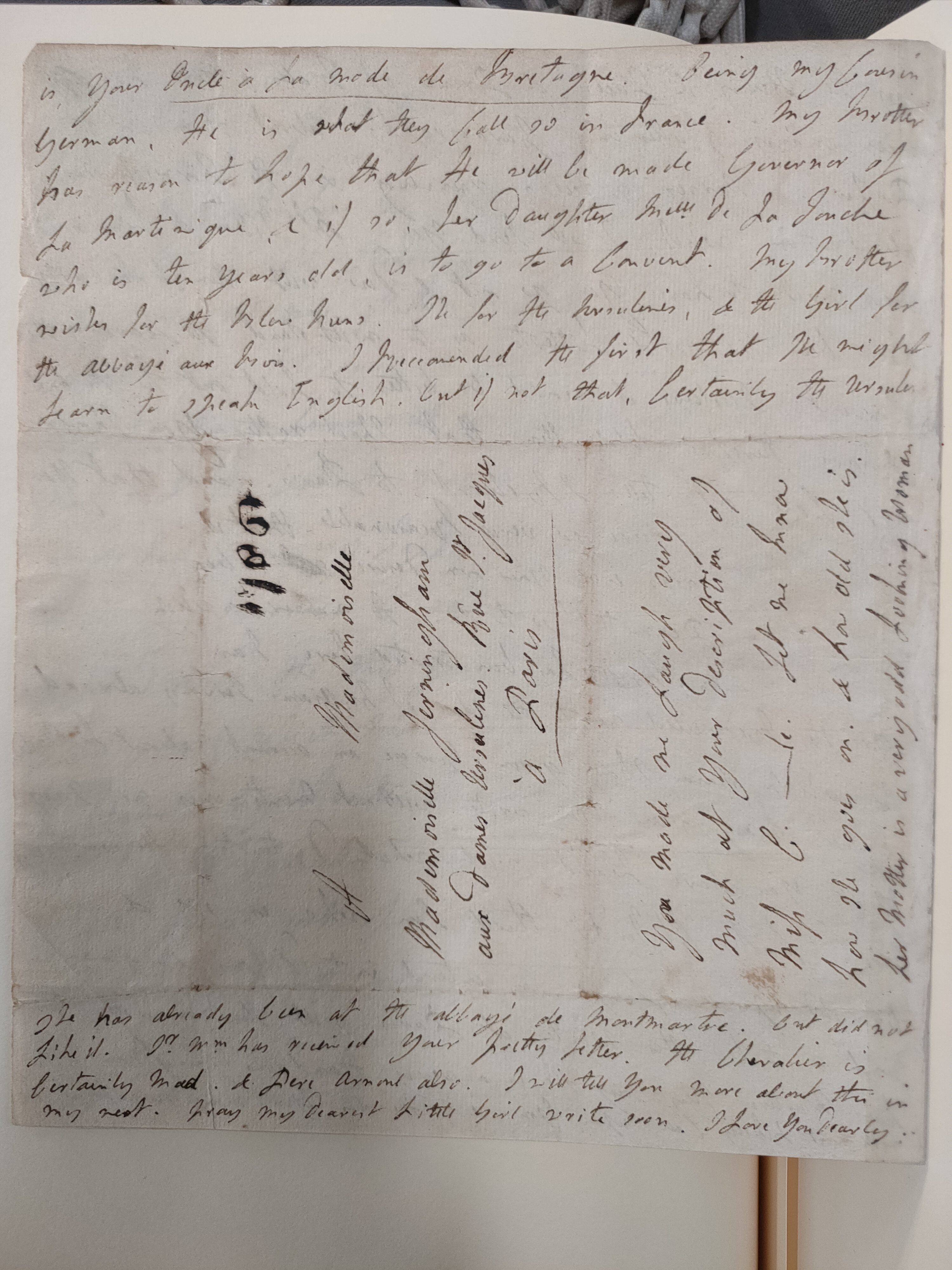344 - Lady Frances Jerningham to Charlotte Jerningham, 2 January 1786
- Transcription
- Letter Details
- People (2)
- How to Cite
Image 1 of 4

Image 2 of 4

Image 3 of 4

Image 4 of 4

My Dearest Charlotte,
We left London on Tuesday last 25th,
& arrived here, in the middle of snows, the day after. Your
uncle Arthur and his Lady who lodged with us at Lothian's
Hotel, left London about ten minutes before we did. They
proposed stopping a night or two at Sir Edward Hailes,
near Canterbury; and then again some days at Cambray where
Dillon's regiment is & where also are Mde Dillon's mother (Mde de Girardin),
her son and daughter. From which place they all proceed
together to Paris, where they both promised me they would
call upon you two days after their arrival. They have got
for you, 5 guineas in money, a letter from Mama with
a very pretty steel neck lace which I hope you will like.
Mrs. Dillon is a good Humour'd, well meaning woman, much
attach'd to my Brother, which gives her great merit in my
eyes, as he is really a most aimable Man every way, the
best of Hearts with every other Good Quality. He succeeded
very much here. We were in London but three weeks, but
during that time all the Great People seem'd to wish to [damaged]
him how much he was esteem'd. Lord Carmarthen told
he had to thank him, as Secretary of State, for his
Humanity & noble Behaviour to the English in the Island
& what was still more flattering. Lord Thurloe, the Chanc[damaged]
desired to be introduced to him, to say that he had
Respected him in Common with every Body as a very Brave Officer,
but that he saw he was not a less good Civilian;
as he had been very happy to put his name Thur[damaged],
under my Brothers name, to ratify all the decrees he
passed during the three years he was governor of St.
Christopher's. which island being ceded again to the English,
the Business my Brother had done there had been revised
here and {^approved} by the Chancellor. His approbation, as he is in general
a very Rough sort of Gentleman, is extreamely flattering
& raised my Brother very much in the Opinion the people
here. In short I must own it gave me great pleasure
to see him thus Received. He was also taken great notice
of by the King, and Queen, and Prince of Wales; & there has
been many flattering paragraphs about him in the
Papers. There appeared also Verses, 3 weeks running, in the Norwich Mercury
which I will send you. Mde Dillon & him wish
very much to have you go out & dine with them but as you
have been so good hitherto as to withstand the leaving the
convent I believe it would be better to hold out to the end.
[damaged] have therefore told them that I had rather you should
[damaged]t come out till I Return’d to Paris and that you
were so very Reasonable that it
was even your own desire to be
Permitted so to do. The manner in which
my brother has been treated here, has
greatly Reconciled me to the idea of William’s serving abroad,
for which reason I have given George an account about his Uncle.
You may when you write without mentioning me say
that you have hear’d with what distinction He was treated
[damaged] Lady Clifford's third son, who is 18 & was
brought up at Liege, is entered into Dillon's regiment,
and is to be this winter at Paris with them in order to
have Masters. They say he is a very Handsome Young Man. He
will most likely call upon you; and if he does, you may say that he
is your Oncle a la mode de Bretagne; being my Cousin
German he is what they call so in France. My Brother
has reason to hope that he will be made Governor of
La Martinique; &, if so, his wife's daughter, Mlle de la Touche,
who is ten years old is to go to a Convent. My Brother
wishes for the Blue Nuns, his wife for the Ursulines, and the Girl for
Abbaye aux Bois. I recommended the first, that she might
learn to speak English; but if not that, certainly the Ursulines.
[change of orientation]
You made me Laugh very
much at your description of
Miss C------le. Let me know
how she goes on & how old she is
her Mother is a very odd looking woman.
She has been already at the Abbaye de Montmartre, but did not
like it. Sr Wm has received your pretty letter. The Chevalier is
certainly mad and Pere Arnout also. I will tell you more about this in
my next. Pray My Dearest Little Girl, write soon. I love you Dearly.
My Dearest Charlotte,
We left London on Tuesday last 25th,
& arrived here, in the middle of snows, the day after. Your
uncle Arthur and his Lady who lodged with us at Lothian's
Hotel, left London about ten minutes before we did. They
proposed stopping a night or two at Sir Edward Hailes,
near Canterbury; and then again some days at Cambray where
Dillon's regiment is & where also are Mde Dillon's mother (Mde de Girardin),
her son and daughter. From which place they all proceed
together to Paris, where they both promised me they would
call upon you two days after their arrival. They have got
for you, 5 guineas in money, a letter from Mama with
a very pretty steel neck lace which I hope you will like.
Mrs. Dillon is a good Humoured, well meaning woman, much
attached to my Brother, which gives her great merit in my
eyes, as he is really a most amiable Man every way, the
best of Hearts with every other Good Quality. He succeeded
very much here. We were in London but three weeks, but
during that time all the Great People seemed to wish to [damaged]
him how much he was esteemed. Lord Carmarthen told
he had to thank him, as Secretary of State, for his
Humanity & noble Behaviour to the English in the Island
& what was still more flattering. Lord Thurloe, the Chanc[damaged]
desired to be introduced to him, to say that he had
Respected him in Common with every Body as a very Brave Officer,
but that he saw he was not a less good Civilian;
as he had been very happy to put his name Thur[damaged],
under my Brothers name, to ratify all the decrees he
passed during the three years he was governor of St.
Christopher's. which island being ceded again to the English,
the Business my Brother had done there had been revised
here and {^approved} by the Chancellor. His approbation, as he is in general
a very Rough sort of Gentleman, is extremely flattering
& raised my Brother very much in the Opinion the people
here. In short I must own it gave me great pleasure
to see him thus Received. He was also taken great notice
of by the King, and Queen, and Prince of Wales; & there has
been many flattering paragraphs about him in the
Papers. There appeared also Verses, 3 weeks running, in the Norwich Mercury
which I will send you. Mde Dillon & him wish
very much to have you go out & dine with them but as you
have been so good hitherto as to withstand the leaving the
convent I believe it would be better to hold out to the end.
[damaged] have therefore told them that I had rather you should
[damaged]t come out till I Returned to Paris and that you
were so very Reasonable that it
was even your own desire to be
Permitted so to do. The manner in which
my brother has been treated here, has
greatly Reconciled me to the idea of William’s serving abroad,
for which reason I have given George an account about his Uncle.
You may when you write without mentioning me say
that you have heard with what distinction He was treated
[damaged] Lady Clifford's third son, who is 18 & was
brought up at Liege, is entered into Dillon's regiment,
and is to be this winter at Paris with them in order to
have Masters. They say he is a very Handsome Young Man. He
will most likely call upon you; and if he does, you may say that he
is your Uncle a la mode de Bretagne; being my Cousin
German he is what they call so in France. My Brother
has reason to hope that he will be made Governor of
La Martinique; &, if so, his wife's daughter, Mlle de la Touche,
who is ten years old is to go to a Convent. My Brother
wishes for the Blue Nuns, his wife for the Ursulines, and the Girl for
Abbaye aux Bois. I recommended the first, that she might
learn to speak English; but if not that, certainly the Ursulines.
[change of orientation]
You made me Laugh very
much at your description of
Miss C------le. Let me know
how she goes on & how old she is
her Mother is a very odd looking woman.
She has been already at the Abbaye de Montmartre, but did not
like it. Sr Wm has received your pretty letter. The Chevalier is
certainly mad and Pere Arnout also. I will tell you more about this in
my next. Pray My Dearest Little Girl, write soon. I love you Dearly.
Lady Frances Jerningham to Charlotte Jerningham, 2 January 1786
Mother to daughter. They had recently left London and travelled in the snow. She has sent Charlotte a pretty steel necklace which she hopes she will like. Mrs Dillon is a good humoured woman and very devoted to Frances’s brother which pleases Frances. Her brother was received very favourably in London – he has been so handsomely treated that she is reconciled to the idea of William serving abroad. Her brother and Mrs Dillon have suggested visiting Charlotte, but Frances thinks that as she has done well to stay in the convent, that she should try and hold out until Frances goes to collect her. Lady Clifford’s third son is a very handsome young man. Charlotte has made her laugh with her description of Miss C – her mother is also an odd looking woman.
Jerningham Family Papers
JER/37
Cadbury Research Library, University of Birmingham
1786
1
2
Cossey [Norfolk]
aux Dames Ursulines Rue St Jacques a Paris [France]
primary author
eyes
- gifting
- laughing
- travel
- visiting
- writing
separation
- affection
- love (parental)
weather
primary addressee
writing
clothing
school
To Cite this Letter
Lady Frances Jerningham to Charlotte Jerningham, 2 January 1786, 211786: Cadbury Research Library, University of Birmingham, Jerningham Family Papers, JER/37
To Cite this Edition
Material Identities, Social Bodies: Embodiment in British Letters c.1680-1820. Compiled by: Karen Harvey, Helen Esfandiary, Sarah Fox, Emily Vine, University of Birmingham. Project funded by the Leverhulme Trust (2021-2025, Ref. RPG-2020-163), https://socialbodies.bham.ac.uk.